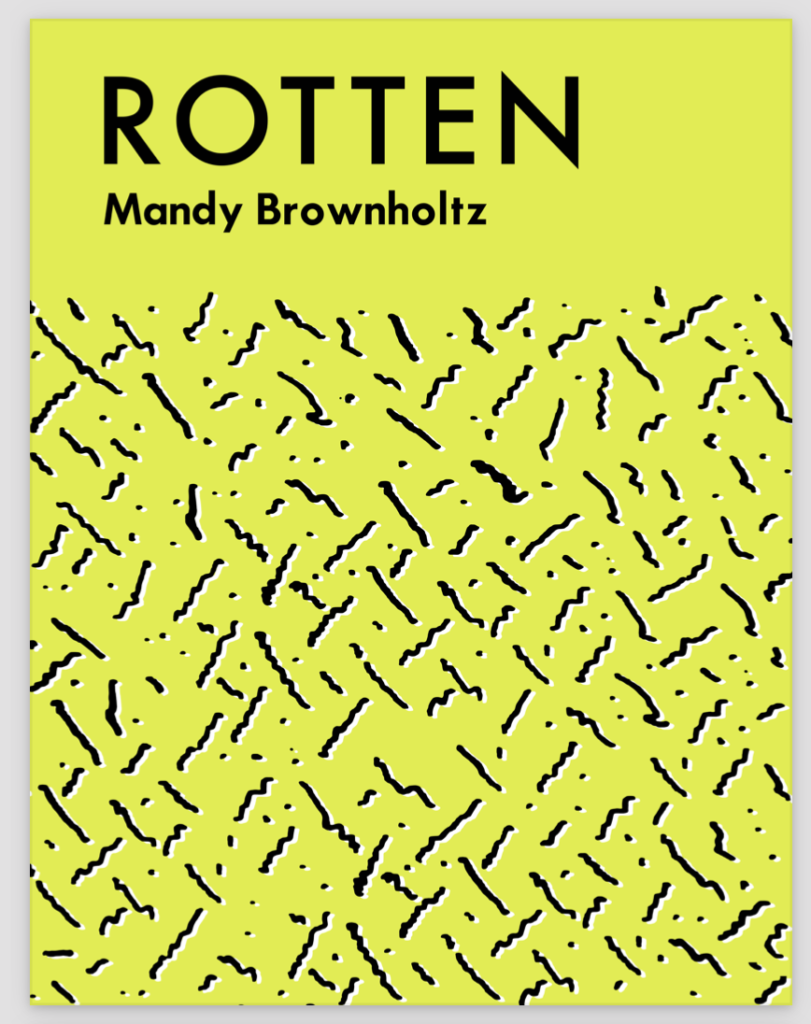The summer of 2017 birthed a period of unrest. A year and a half into Trump’s presidency coupled with unrestrained, dismissive handling of sexual assault victims compounded what was already suppressed.
Later that year, it inspired the social movement #MeToo. A shockwave of community support inundated social media. Non-men in particular were given spaces to speak about their sexual assaults and abuse and to hold those accountable. In the thick of this, Mandy Brownholtz began writing Rotten, a self-published novel out June 22.
What started as a collage of multiple women’s stories was eventually scaled down to follow one protagonist. It’s a move that’s often more effective when bringing to light a harsh reality. Written almost entirely in limited third person, the absence of an unreliable narrator guides the reader with a comprehensive roster to walk alongside the protagonist.
The novel follows Viv, a young journalist trying to piece together narratives through missed nuances. Most chapters work in flashbacks, unraveling what consent means beyond an actual event, and how thoughts redevelop in response to our traumas.

“This book was an exercise in examining what choice and consent really mean when so many things that happen in our lives are out of control,” Brownholtz said.
“Lack of agency can start way before any type of assault happens,” she said… “And [Viv] is a pretty flawed character. She can be kind of toxic at times, and make some bad choices.”
Viv’s impulsive nature folded into adulthood and by vestiges of a patchy relationship with her father, a debilitating friendship with her roommate Lulu and mixed signals from Nolan, a boy she liked as a younger version of herself.
Balancing a pool of characters, memories and present events, Brownholtz instructs form on the page. Playing with memory effortlessly, her flow of prose mimics natural cycles of remembrance. Sometimes what’s important is stimulated with a nail of detail, like smells of a busy restaurant or counting mosquito bites at a party, as Viv did.
Brownholtz also withholds information as a way to build suspense. “People who have been victims of sexual misconduct compartmentalize things and don’t totally accept what happened right away,” she said. “The jumping around was intentional because I wanted to emphasize the way a singular moment on its own would have no meaning. It can become very meaningful when the context changes to something that has happened.”
At one moment, Viv scans the shelves of serums at Target and then she transports to her family’s dysfunctional past. Another instance, Viv interviews Nolan for her piece on Fort Rotten, an old house venue she used to hang out in. There, she immediately dips into a flashback of Nolan’s housemates freezing a dead rat for a pet snake’s lunch. What’s interesting is how Brownholtz dabbles with simile throughout the novel when comparing two types of memories: ones that are pretty bright and clear, and others that shine dimmer.
In another scene, she compares her father’s scolding words to generalizations of a television script. Despite frequent use of omission and simile to regard trauma, Brownholtz’s mapping is easy to follow. Each detail streamlines into the next as securely as a magnet. The reader is always comfortably recalibrated into Viv’s realities, both past and present.
“One event changes your perception of a place you’ve known your whole life,” she said. Like how Viv’s memories operate in grain, Brownholtz told me people and places in the book were composite versions of her own life. For instance, the narrator explains: “The next time Viv would walk around here wouldn’t be until everything happened, and she’d be struck by the way it felt remarkably different than the hundreds of times she has been down here before, school field trips and museum visits. She noted the way little pieces of yourself fall off like trash, gum wrappers and fuzz you pick off a sweater.”
“She’s always searching for something she can’t quite get her hands on,” Brownholtz said about her main character. To Viv, it vacillates between side jobs like nudist modeling or cat-sitting for rent money to stitching together legitimate details of a scenario.

“I wanted to show how interconnected all of these things are,” she said. “There are so many levels of nuance to all of this and there is no way that it’s supposed to happen.”
Sexual assault, sexual misconduct and what exists between margins has always plagued DIY scenes, as Brownholtz and I discussed afterward. A reason why she decided to write this book was to untie the exclusivity of DIY. The fact is, the darker parts have always existed in a community lauded on support and accommodation, and gatekeeping culture diminishes awareness. Sometimes we don’t even know we’re participating.
“I hope this book opens some hearts and minds when we begin to re-open venues and restructure the way we do things,” Brownholtz said.
We need to speak up, do our part and weed out negative and toxic behavior before it keeps on growing and spreading. While it’s a slow pry of the jar lid, momentum is what matters most.
This interview has been edited for clarity.
